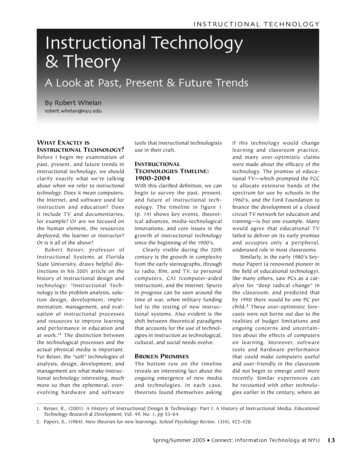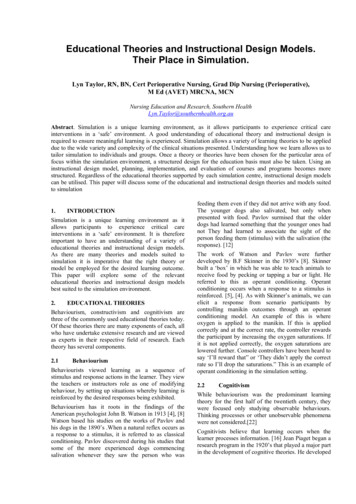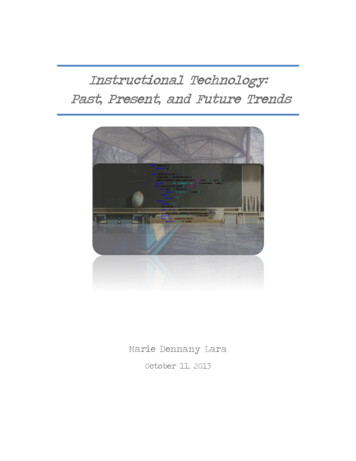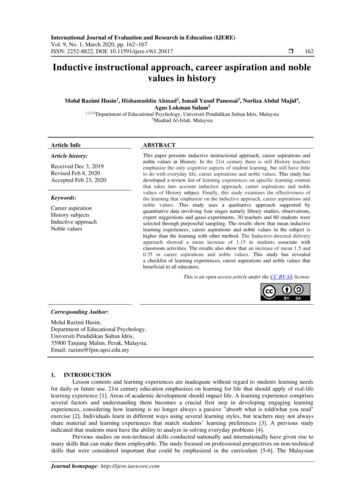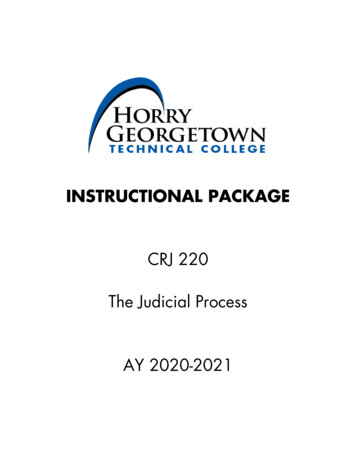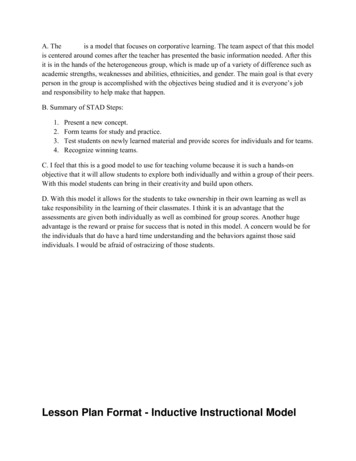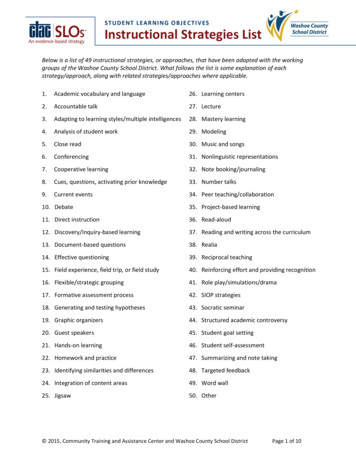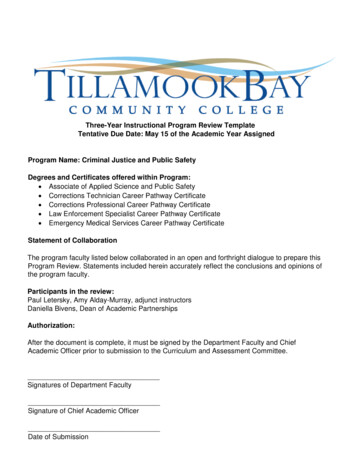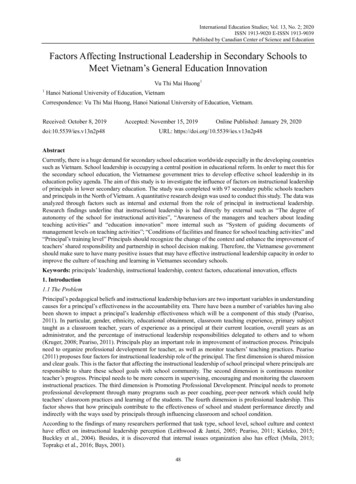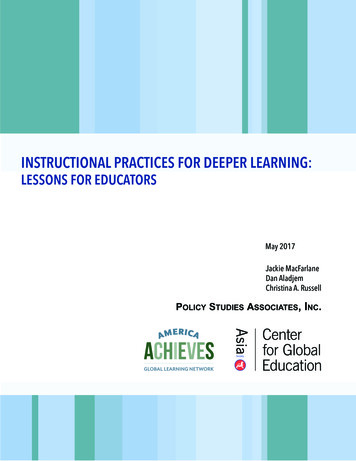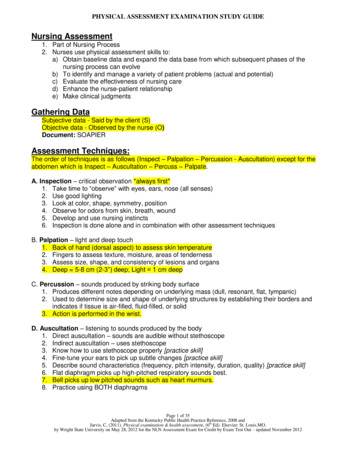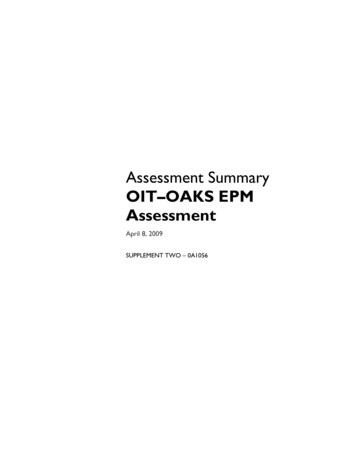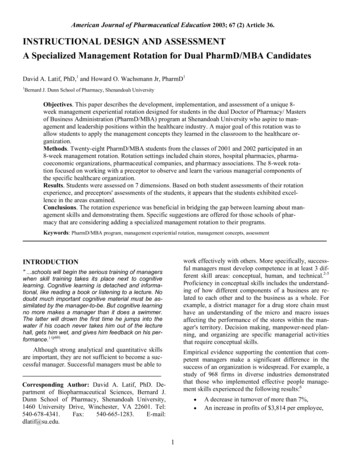
Transcription
American Journal of Pharmaceutical Education 2003; 67 (2) Article 36.INSTRUCTIONAL DESIGN AND ASSESSMENTA Specialized Management Rotation for Dual PharmD/MBA CandidatesDavid A. Latif, PhD,1 and Howard O. Wachsmann Jr, PharmD11Bernard J. Dunn School of Pharmacy, Shenandoah UniversityObjectives. This paper describes the development, implementation, and assessment of a unique 8week management experiential rotation designed for students in the dual Doctor of Pharmacy/ Mastersof Business Administration (PharmD/MBA) program at Shenandoah University who aspire to management and leadership positions within the healthcare industry. A major goal of this rotation was toallow students to apply the management concepts they learned in the classroom to the healthcare organization.Methods. Twenty-eight PharmD/MBA students from the classes of 2001 and 2002 participated in an8-week management rotation. Rotation settings included chain stores, hospital pharmacies, pharmacoeconomic organizations, pharmaceutical companies, and pharmacy associations. The 8-week rotation focused on working with a preceptor to observe and learn the various managerial components ofthe specific healthcare organization.Results. Students were assessed on 7 dimensions. Based on both student assessments of their rotationexperience, and preceptors' assessments of the students, it appears that the students exhibited excellence in the areas examined.Conclusions. The rotation experience was beneficial in bridging the gap between learning about management skills and demonstrating them. Specific suggestions are offered for those schools of pharmacy that are considering adding a specialized management rotation to their programs.Keywords: PharmD/MBA program, management experiential rotation, management concepts, assessmentwork effectively with others. More specifically, successful managers must develop competence in at least 3 different skill areas: conceptual, human, and technical.2-5Proficiency in conceptual skills includes the understanding of how different components of a business are related to each other and to the business as a whole. Forexample, a district manager for a drug store chain musthave an understanding of the micro and macro issuesaffecting the performance of the stores within the manager's territory. Decision making, manpower-need planning, and organizing are specific managerial activitiesthat require conceptual skills.INTRODUCTION" .schools will begin the serious training of managerswhen skill training takes its place next to cognitivelearning. Cognitive learning is detached and informational, like reading a book or listening to a lecture. Nodoubt much important cognitive material must be assimilated by the manager-to-be. But cognitive learningno more makes a manager than it does a swimmer.The latter will drown the first time he jumps into thewater if his coach never takes him out of the lecturehall, gets him wet, and gives him feedback on his performance.1 (p60)Although strong analytical and quantitative skillsare important, they are not sufficient to become a successful manager. Successful managers must be able toEmpirical evidence supporting the contention that competent managers make a significant difference in thesuccess of an organization is widespread. For example, astudy of 968 firms in diverse industries demonstratedthat those who implemented effective people management skills experienced the following results:6Corresponding Author: David A. Latif, PhD. Department of Biopharmaceutical Sciences, Bernard J.Dunn School of Pharmacy, Shenandoah University,1460 University Drive, Winchester, VA 22601. .edu. 1A decrease in turnover of more than 7%,An increase in profits of 3,814 per employee,
American Journal of Pharmaceutical Education 2003; 67 (2) Article 36. designed to provide health care to customers. Healthcare managers need a broad organizational overview tosuccessfully plan, organize, lead, and control within thedynamic health care environment. They need to knowhow to motivate, lead, and work with others to accomplish organizational and personal objectives. To thisend, the program is directed toward providing the education students need to develop an understanding of themajor functional areas in health care organizations, andto design strategic plans and policies to cope with thechanging pharmaceutical and health care environments.By combining a "generalist" management degree with aPharmD degree, students will gain the requisite skills todo this and will realize significant additional career opportunities.An increase in sales per employee of 27,044,andAn increase in stock market value per employee of 18,641 compared to firms that hadless effective management.A study of 5-year survivability in 136 nonfinancialcompanies that issued initial public offerings (IPOs)in the late 1980s found that the most significant predictor of longevity was effective management.7Effective management skills are more important thanindustry, environment, competition, and economicfactors combined.3,6,7 A major problem is that knowing about management skills is not the same as demonstrating management skills. Applying this statementto pharmacy management curricula, what is learned inthe lecture hall pertaining to the various aspects ofmanagement is only one component of ensuring thatDoctor of Pharmacy (PharmD) graduates becomecompetent future healthcare managers. This authorpreviously described a model, based on social learning theory, for developing the management skills ofpharmacy students within the classroom.8What are potential job opportunities for those students who graduate with the PharmD/MBA degree? Thedual degree is designed to aid students who seek positions of management and leadership that require a combination of patient care and management skills. A recentdescriptive report describing PharmD/MBA programsrevealed that the majority of graduates with the dual degree take initial positions in the pharmaceutical industry.9 Positions within industry include marketing, clinical research, academic detailing, and drug development.Other potential employment areas for graduates of thedual program include, but are not limited to:One opportunity for pharmacy students, especially those who aspire to management and leadershippositions, to apply the management concepts thathave been learned in a laboratory setting (ie, classroom) to a field setting is through a specialized management rotation. To this end, the major goal of thispaper was to describe the development, implementation, and assessment of a unique 8-week managementexperiential rotation designed for students enrolled inthe joint Doctor of Pharmacy/Masters of BusinessAdministration (PharmD/MBA) program at a privatesoutheastern school of pharmacy. Institutional formulary development and managementPharmacoeconomics in industry and managedcareManaged Care ManagementBiotechnologyManagement of any health care institutionProfessional association work (eg, AmericanPharmaceutical Association, National Community Pharmacists Association)Outcomes researchMonitoring clinical trialsProject management in health careTeaching in a college of pharmacyChain store pharmacy managementA description of the PharmD/MBA program at aprivate southeastern school of pharmacy is provided.The rationale and criteria for a specialized management rotation targeted to those students with specialized management education and training (ie, MBAcandidates) is discussed. Student and preceptor assessments of the classes of 2001 and 2002 management rotations are discussed, along with suggestionsfor schools of pharmacy considering the developmentof a management rotation for their students.METHODSBackground: PharmD/MBA DescriptionCurriculum and Course Load Upon admission to the MBA program, studentswere required to meet with the PharmD/MBA program director to discuss required prerequisite coursesand a plan of study for the completion of the MBAThere is one major goal of the jointPharmD/MBA program: to educate students to assume responsibilities as managers, administrators,consultants, and executives in health care systems2
American Journal of Pharmaceutical Education 2003; 67 (2) Article 36.students based on our criteria?" The specific criteria varied depending on the targeted organization (eg, a chain'scriteria may differ from that of a medical affairs department at a pharmaceutical company). The preceptorswere mostly registered pharmacists with significantmanagerial experience. The few who were not registeredpharmacists had advanced degrees and significantmanagerial experience. An overview of the basic criteriaof a pharmacy chain is described below.component of the program. All MBA courses wereoffered on a 14-week trimester basis. Classes metone night per week from 6:00 PM until 9:00 PM.Each PharmD/MBA student was given a 5- to 6week summer break. The course schedule can befound in Appendix 1.A major advantage to prospective PharmD/MBAstudents is the cooperation between the School ofPharmacy and the School of Business Administration.Specifically, by taking up to 3 classes during thesummers and by counting several pharmacy administration courses toward the MBA degree, students canfinish both the PharmD and MBA degrees concurrently (Appendix 1). This is an advantage over thelength of time to complete most dual degreePharmD/MBA programs, which, on average, take 5years.9 In addition, an integral component of obtaining the MBA degree is a specialized 8-week management rotation normally done at the beginning ofthe candidates' fourth professional year.OverviewThe 8-week management rotation focused on working with a preceptor to observe and learn the variousmanagerial components of the healthcare organization.A tentative guideline to progression through the 8 weeksin a retail pharmacy chain included the following:Weeks 1 and 2. Weeks 1 and 2 were designed togive the student a basic understanding of the day-to-dayfunctions of the technical and management aspects ofthe healthcare organization. By the end of the 2-weekperiod, the student was expected to have a grasp of theoperation. For example, by the end of the second weekthe student was expected to be comfortablecommunicating with the store and pharmacy manager,using the retail terms he or she had learned up to thatpoint. Specific activities included observing thepreceptor interpreting pharmacy reports, orderinginventory, handling customer complaints, andexamining workflow procedures.Weeks 3 and 4. Weeks 3 and 4 were designed togive the student a more in-depth exposure to management issues. The guiding goal during these 2 weeks wasthe expectation that, at the end of the fourth week, thestudent would have developed a business sense for whatit takes to operate 30 or more pharmacies. The studentwas expected to be able to explain such terms and concepts as "third party audits," the profitability differencesbetween generic and brand prescriptions, thestore/pharmacy relationship, and the components of theannual employee review. In addition, by the end of week4, the student was expected to have an "applied" knowledge of many of the things he/she had learned in thePharmD/MBA program. Specifically, the student wasexpected to identify a management problem (in cooperation with the preceptor) that he or she would like to pursue. The student was expected to proceed with this project, and at the end of the 8-week rotation, to present hisor her findings to the organization. The purpose of thiscomponent of the rotation was to encourage the studentto: Identify and define a "management" problem and accompanying research objectives;Rationale for Management RotationAs discussed previously, knowing about management skills is not the same as demonstrating them.Although, certain management skills can be demonstrated in a classroom environment, a greater andricher experience may result through practicing management skills in a field setting (rotation site) as opposed to a laboratory setting (classroom). Using thisguiding principle, the following criteria for the management rotation were developed in cooperation withpotential preceptors.Course DesignThe primary purpose of the specialized management rotation was to apply the management knowledge and skills learned during the PharmD/MBA educational experience at Shenandoah University to ahealth care setting. Managers plan, lead, organize, andcontrol individuals and resources. Thus, a major goalwas to expose the student to the daily operations ofmanaging within a health care system. Typical management rotation sites included chain stores (eg, store,district, and regional levels), mass merchandiserpharmacies, hospital pharmacies, pharmacoeconomicorganizations, pharmaceutical companies, and pharmacy associations. The organizations were chosenbased on their ability and willingness to fulfill thegoals of the rotation (see overview below). Shenandoah's PharmD/MBA director, the Experiential Director, and the Pharmacy School's Dean identified thepotential rotation sites. The hallmark for considerationwas, "Can the site provide a useful experience for our3
American Journal of Pharmaceutical Education 2003; 67 (2) Article 36. agement rotation. An item was listed under each dimension to which it pertained. For example, dimensions under "communication" included such items as "the student demonstrated effective written and verbal skills,"and "the preceptor considers the student to be a goodlistener." The number of items under each dimensionranged from 4 to 10. In addition, each student was assessed on his or her research project and presentation ofthat research. All students were evaluated at the end oftheir 8-week rotation. Analysis of reliability was assessed using Cronbach's alpha and revealed a 0.94 numerical coefficient.Develop a research plan for collecting information;Implement (or propose) a research planfor collecting and analyzing the data; andInterpret and report the findings or propose a course of action based on the research plan.In addition, this activity often was extremelyhelpful to the organization because it addressed a specific problem faced by the organization. The projectgrade comprised part of the student's rotation gradeand was determined by the content of the project, thequality of the literature review and its applicability tothe specific problem, and the student's presentationstyle. "Evaluating payroll in three pharmacies" is anexample of a student's project. The goal of this projectwas to evaluate factors related to why or why notpharmacies met their projected payroll.The PharmD/MBA class of 2001 included 8 students, while the class of 2002 included 20 students. Anindependent-samples-t-test was performed on each criterion to determine whether the 2 classes differed significantly from each other. They did not. Table 1 depicts themean scores of the combined 2 classes on each criterion.As revealed, the mean scores of the classes on each criterion demonstrate that the PharmD/MBA candidatesexhibited excellence in the assessed areas.Weeks 5 and 6. During weeks 5 and 6, the student worked with the company's human resourcemanager to develop an understanding of the needs ofthe employees and the organization. By the end ofweek 6, the student was expected to be able to explainhow the chain recruits, interviews (eg, what is /is notlegal to ask during an interview), and the steps in hiring employees. In addition, the student was expectedto learn company procedures regarding performanceappraisals, company benefits, salary, exit interviews,and terminating employees.RESULTSStudents assessed their overall experience on thespecialized management rotation qualitatively via comments. They were asked about their overall experienceon the rotation. All available comments are listed inAppendix 2.Weeks 7 and 8. Weeks 7 and 8 were designed toallow the student to spend time with the company'stop executives in the region in order to understand thevital roles of the regional vice president and the director of pharmacy operations. A basic goal of this experience was to expose the student to the role topmanagement plays in guiding field management toward the overarching goals of the organization.DISCUSSIONAlthough there is no baseline for comparison, basedon the empirical data from 28 PharmD/MBA graduatesand their preceptors, the specialized management rotation was useful for students. In general, the studentcomments were enthusiastic and reflected favorably ontheir experiences. One common theme in the commentswas the "real world" experiences that the students received. The specialized management rotation was significantly longer (8 weeks versus 6 weeks) than traditional rotations, and it required that the students contribute by participating and presenting a "real-life" researchproject. Using the popular work redesign research ofHackman and Oldham as a guide, this rotation designmay motivate students by favorably addressing 5 corejob dimensions: skill variety, task identity, task significance, autonomy, and feedback.10 Depending on thespecific rotation, students were able to work on manydifferent tasks that required a variety of skills. They experienced task identity and significance because theyAssessment of Management RotationsStudents on the management rotation were assessed primarily on exhibiting managerial skills. Theprimary skills assessed by preceptors were communication (including research project presentation), socialand professional interactions, problem solving, ethicaldecision making, personal and professional growth,and overall managerial skills.The assessment dimensions were developed bythe School of Pharmacy's Director of PharmD/MBAprogram and the Director of Experiential Education.The instrument was developed in close cooperationwith the preceptors involved in the specialized man-4
American Journal of Pharmaceutical Education 2003; 67 (2) Article 36.Table 1. Dimension Assessment Scores of PharmD/MBA ClassesMean (SD)DimensionNRangeCommunication282.59.27 (0.69)Problem-solving233.09.30 (0.67)Social273.09.43 (0.70)Ethical222.09.48 (0.61)Personal and professional growth283.09.40 (0.82)Research presentation264.09.23 (0.85)Overall management283.09.21 (0.74)* Likert scale responses: 1 “Student does not perform” to 10 “Student excels.” Differences in N arise from somepreceptors not observing enough behavior on a particular criterion to make a valid assessment.were able to work on a project from beginning to end(eg, "what I did makes a difference"). The studentsexperienced a high level of autonomy in both choosing and designing their research projects. Feedbackwas provided in the form of an evaluation of the student's project (based on the student's presentation ofhis or her results) and in the form of an overall gradeon the rotation.ganization via completion of a pertinent research project).A major suggestion for other schools of pharmacythat may consider a specialized management rotationis to make it long enough (eg, 8 weeks appears to be agood length) to substantially benefit both the organization and the student. For example, a 4-week rotationmay not hold any benefit for the organization becausethe preceptor may have spent the 4 weeks training thestudent. It is important that both sides benefit (ie, havea win-win experience).A second caveat pertains to the mean evaluationscores preceptors gave their students. Specifically, theywere all quite high, with minimal standard deviations.This might suggest 2 things. First, that the best pharmacy students were admitted into the MBA programand they all performed at a high level. Or, second, thepreceptors had a difficult time discerning optimal management performance from mediocre or suboptimal performance. Further research is needed to answer thisquestion.There are several caveats to this investigation. First,the experiences written about were those of a sm
1Bernard J. Dunn School of Pharmacy, Shenandoah University Objectives. This paper describes the development, implementation, and assessment of a unique 8-week management experiential rotation designed for students in the dual Doctor of Pharmacy/ Masters of Business Administration (PharmD/MBA) program at
